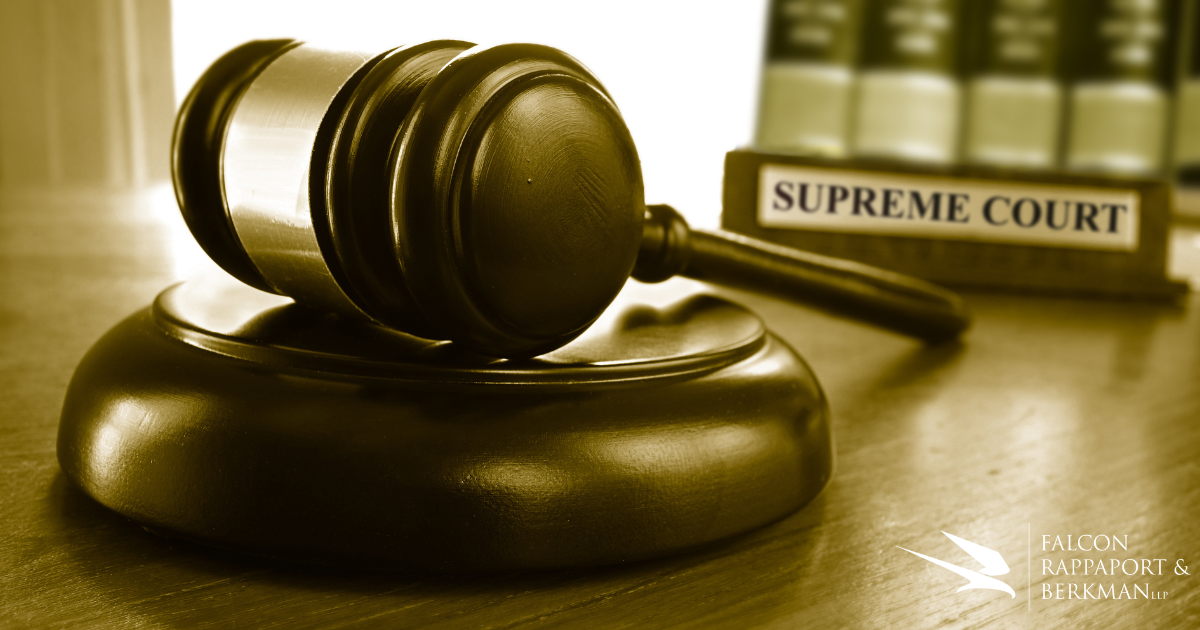SUPREME COURT ALERT: Supreme Court Holds That Section 523(a)(2)(A) Bars Debtor from Discharging Debt Obtained by Fraud, Regardless of Culpability
By: Michael L. Moskowitz, Esq. and Melissa A. Guseynov, Esq.
In a unanimous decision handed down on February 22, 2023, the Supreme Court held a judgment debt non-dischargeable pursuant to section 523(a)(2)(A) of the Bankruptcy Code, notwithstanding the fact that one of the obligors was innocent of any wrongdoing. See Bartenwerfer v. Buckley (Case No. 21-908, Feb. 22, 2023). Although a debtor may discharge most debts in a bankruptcy case, section 523(a)(2)(A) of the Bankruptcy Code precludes the discharge of any “debt … for money … to the extent obtained by … false pretenses, a false representation, or actual fraud.” 11 U.S.C. § 523(a)(2)(A).
In 2005, Kate Bartenwerfer (“Debtor”), and her then boyfriend David Bartenwerfer (now husband), jointly purchased a home in California. The home was remodeled and later sold to Kieran Buckley (“Buckley”) who, in 2007, sued the couple and was awarded a $200,000 judgment after discovering significant defects in the home which were not disclosed. Debtor was not involved in the remodel or sale of the property.
After later commencing a chapter 7 case, Buckley claimed the judgment debt was non-dischargeable, as it arose from, among other things, fraudulent representations. The Bankruptcy Court agreed with Buckley, finding the judgment to be non-dischargeable. The Bankruptcy Appellate Panel for the Ninth Circuit reversed as to Debtor due to the fact she was not aware of her husband’s fraudulent intent. The Ninth Circuit, however, reversed the holding, agreeing with the Bankruptcy Court that the debt was non-dischargeable in bankruptcy.
Writing for the Court, Justice Amy Coney Barrett resolved a split among the circuit courts, as the Second, Fourth, Seventh and Eighth Circuits required a culpable state of mind for a debt to be considered non-dischargeable, while the Fifth, Sixth, Ninth and Eleventh Circuits did not.
Noting the passive voice used in section 523(a)(2)(A) of the Bankruptcy Code demonstrates Congress intended the debt result from fraud but was not concerned about the “wrongdoer as the relevant actor,” Justice Barrett stated the ‘[p]assive voice pulls the actor off the stage.” The Court also reaffirmed its own 1885 ruling in Strang v. Bradner, wherein it held the “fraud of one partner … is the fraud of all because ‘[e]ach partner was the agent and representative of the firm with reference to all business within the scope of the partnership.’” Strang v. Bradner, 114 U.S. 555, 561 (1885) (internal citation omitted).
Justice Barrett concluded her opinion by noting that although “[w]e are sensitive to the hardship she [Debtor] faces … Congress has ‘evidently concluded that the creditors’ interest in recovering full payment of debts’ obtained by fraud ‘outweigh[s] the debtors’ interest in a complete fresh start,’ and it is not our role to second-guess that judgment.”
Justice Sonia Sotomayor filed a concurring opinion, which was joined by Justice Ketanji Brown Jackson. The concurring opinion left open the question of whether the result would have been different if the debtors had been married at the time of the sale of the house to Buckley. In the instant fact pattern, the Bartenwerfers were business partners, not spouses. The decision unambiguously holds that business partners are liable for the acts of the other but fails to provide insight into what the result would have been if the Bartenwerfers were married at the time of the sale.
While the Bankruptcy Courts are known to be courts of “equity,” the Supreme Court may be shifting away from that concept. The decision sends a clear message that this Supreme Court may be more inclined to protect creditors rather than debtors.
DISCLAIMER: This summary is not legal advice and does not create any attorney-client relationship. This summary does not provide a definitive legal opinion for any factual situation. Before the firm can provide legal advice or opinion to any person or entity, the specific facts at issue must be reviewed by the firm. Before an attorney-client relationship is formed, the firm must have a signed engagement letter with a client setting forth the Firm’s scope and terms of representation. The information contained herein is based upon the law at the time of publication.

